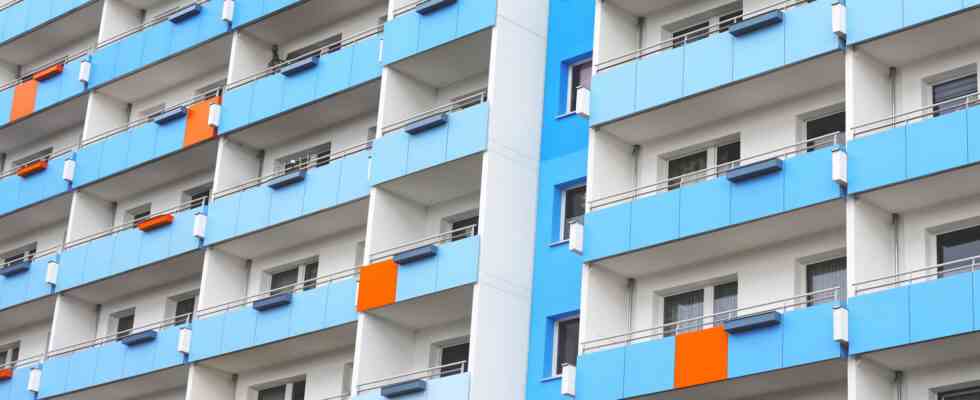Status: 09/28/2022 07:17 a.m
The cabinet wants to get the housing benefit reform under way today. With the new law, far more households are to receive more money. So far so good. But who should process all the applications?
If you want to receive housing benefit in Dresden, your application ends up on Bianka Bernhardt’s desk in the housing benefit office. Here are the files that the clerk is currently working on with her 39 colleagues, and there are the new ones on the other side: “Pretty much all of them from September and August,” she reports. In the two months, new applications have doubled compared to the previous year.
This is one of the reasons why Dresden’s head of social affairs, Kristin Klaudia Kaufmann, is concerned about the expansion of the housing benefit entitlement, as provided for by the federal government. Because then about three times as many households should be entitled to state support. “Of course, a tripling means that we also need three times as many employees to make the application possible quickly,” said the left-wing politician ARD-Magazine fact. In Dresden, applicants have already had to wait almost three months for a decision. And suitable staff can hardly be found. It is therefore possible that the housing allowance may not be paid out until summer. “It’s a simple rule of three: Every colleague who can’t be found means that the processing time is longer,” says Kaufmann.
Up to ten months waiting time?
Dresden is not alone in having concerns. In Berlin, too, there are some question marks regarding the implementation of the housing benefit reform on January 1 of next year. Urban development senator Andreas Geisel said a few weeks ago that there would only be advance payments in Berlin for the time being. The new law allows provisional advance payments to be made before the application is decided. SPD politician Geisel expects the full amounts to be paid out from March 2023 onwards. In Munich it is already the case that applicants have to wait between nine and ten months, according to a spokeswoman for the social department ARD Capital Studio communicated.
The time factor plays an important role for those affected. After all, people who are being pushed to the breaking point by the high prices need relief quickly. When the third relief package was presented, Chancellor Olaf Scholz repeated his mantra that no one would be left alone. And he announced the “biggest housing benefit reform” in a long time. Instead of around 600,000 households in the past, around two million households nationwide will be able to receive housing benefit in the future. According to the draft law by Federal Building Minister Klara Geywitz, the reform will lead to an average increase in housing benefit of 190 euros. At the moment, housing benefit households receive an average of 177 euros, the Federal Statistical Office has calculated. On average, the housing benefit is at least doubled.
Not enough?
The social associations welcome the plans in principle. Nevertheless, even after the reform, not enough people benefited from the housing benefit, said Ulrich Schneider, general manager of the Paritätischer Gesamtverband, to the ARD-Magazine fact. In Germany there are 7.7 million households below the poverty line: “More than three million of them are currently receiving basic security benefits. But there are still around 2.8 million households that would still get nothing even with such a housing benefit reform, although they are poor.”
The Ministry of Construction sees things differently. Anyone who gets the minimum wage or a pension of a similar amount could expect an application for housing benefit to be approved, said Minister Geywitz. The calculations for the ministry come from Ralph Henger from the German Economic Institute. He is of the opinion that households at risk of poverty are almost completely covered by the increasing benefits for basic security and housing benefit. People who have less than 60 percent of the median income are considered to be at risk of poverty.
Many factors determine the amount of housing benefit
Income limits will be raised so that more households receive the support. However, because the housing benefit continues to take several factors into account, it is not yet possible to say who exactly will receive the support and with what income. The place of residence and its rental price level, the income and the amount of the rent or the charges caused by the property are taken into account. Because housing benefit can be paid as a rent subsidy or as a subsidy for, for example, a condominium.
Another new feature is that heating costs should be taken into account in the future. The traffic light coalition wants to introduce an additional heating cost subsidy for the months up to the turn of the year. Social associations criticize the fact that electricity costs are not included in the calculation of housing benefit.
quarrel about money
Last but not least, there is a dispute over money – and that will play a role at the latest at the prime ministers’ conference next week. In the budget of the Federal Building Ministry, 4.7 billion euros have been earmarked for the innovations. Actually, half of the housing benefit is financed by the federal government and the other half by the federal states. They have now expressed reservations. North Rhine-Westphalia’s Prime Minister Hendrik Wüst, who leads a black-green government, put up a debate as to whether the federal government would have to pay the housing benefit in full. So there should still be a need for discussion here.

